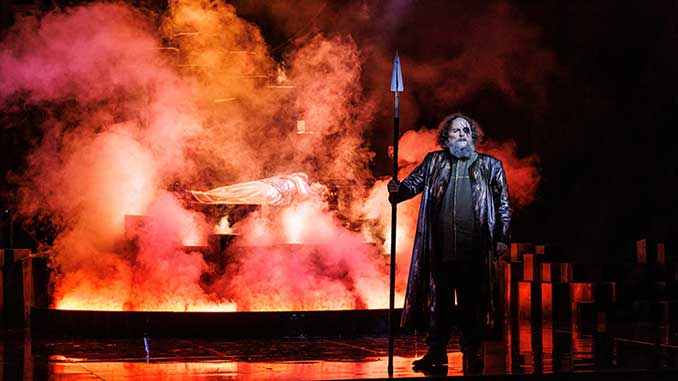 Melbourne Opera’s most ambitious project yet in taking on opera’s greatest show on earth is comfortably and triumphantly sailing a course to what indicates will culminate in a spectacular drenching of music and drama when Wagner’s four-part Der Ring des Nibelungen takes the stage in Victoria’s gold rush city of Bendigo, next March and April.
Melbourne Opera’s most ambitious project yet in taking on opera’s greatest show on earth is comfortably and triumphantly sailing a course to what indicates will culminate in a spectacular drenching of music and drama when Wagner’s four-part Der Ring des Nibelungen takes the stage in Victoria’s gold rush city of Bendigo, next March and April.
The taste of director Suzanne Chaundy’s storytelling clarity along with her design team’s striking and vivid minimalist aesthetic – Andrew Bailey (sets), Harriet Oxley (costumes) and Rob Sowinski (lighting) – have already seen the stage in the first two instalments, Das Rheingold and Die Walküre.
On reflection, a concert performance on Sunday afternoon of the third instalment, Siegfried, seemed an inspired choice and a teaser for what is to come, even if extenuating circumstances may have dictated it that way.
Nothing felt lost in the work’s dramatisation with Chaundy whipping up a richly directed performance throughout that showcased the excellent vocal standards and keenly enacted characterisation among the work’s eight soloists.
Behind them, however, it was the opportunity to see, hear and feel the presence of the eighty-plus young musicians of Melbourne Opera Orchestra. Out of the pit and on stage they particularly impressed as they provided unflinching focus and commitment over 4 hours of music-making.
Coalescing marvellously under the learned command of English conductor and Wagner specialist Anthony Negus – having now become a much-loved fixture at Melbourne Opera – the transcendent beauty, dramatic colours and heaving intensity of Wagner’s music resonated superbly.
From the opening menacing bassoons to the shimmering strings and swelling forces in the final interlude – when Siegfried awakens Brünnhilde on the mountaintop – and through to the cyclonic conclusion of unstoppable ecstatic love, Negus honed exciting, potent subtlety and dramatic fire start to finish.
And amongst this ocean of music, horn player Evgeny Chebkykin’s entrance and exceptional heraldic solo – as Siegfried attempts to mimic the Woodbird’s song while accidentally waking Fafner – brought immediate pinpoint focus to the power of the orchestra’s individual capabilities.
In the punishingly demanding title role, Bradley Daley shaped Siegfried’s journey compellingly from naive and insolent young man to the blooming hero and love-awakened man Siegfried becomes.
Already having the role of Siegfried’s son Siegmund firmly under his belt and fresh from singing the titular Siegfried in Longborough Festival Opera’s fully staged production in June – likewise conducted by Negus – Daley planted himself confidently and at ease without the score.
Apart from a marginal loss of vocal surfing within the orchestral furnace of Act 1’s majestic Forging Song, Daley’s reverberant, crackling-warm and ringing heldentenor adapted convincingly to the journey with the stamina needed.
In Siegfried’s pursuit to learn what fear is, Daley closed an all-round astonishing Act 2 with a blistering performance, shooting forth powerful chesty top notes as Siegfried wonders if he can learn it from the woman atop the mountain as he follows the Woodbird.
Then, in Act 3, there was no doubting Daley’s attuned sensibility with a turn to wrought feeling and vocal tenderness in a wondrously affecting encounter with Brünnhilde on the rock.
Having slept away years, only in the third and final scene of the third act does Brünnhilde appear. Nevertheless, the Everest in sublime music she assails leaves a formidably lasting effect to which soprano Lee Abrahmsen gave a powerfully tempered depiction.
In surges of pendulous emotional bursts swinging from glimmering elegance to leaps of turbocharged top notes, Abrahmsen never held back, including putting meaningful searing voice to the German text, such as the translated, Do you not fear this passionate woman?
The first voice to open the performance, Robert Macfarlane set the tone of the work immediately with great animated class, both in vocal dexterity and acting aplomb as Mime, Siegfried’s manipulative and covetous nurturer from infancy.
In fits of head-tapping and scratching, nose-picking and throws to floor, Macfarlane dug deep in prising out Mime’s obsessiveness and frustrations in a highly memorable manner, his attractive multi-faceted tenor especially riding high with the orchestra in Act 2.
Warwick Fyfe’s rather unwelcome arrival at Mime’s home as Wotan (disguised as The Wanderer) came with signature baritone fortress strength and roof-lifting burnished tone.
As a key figure in the epic’s overall arc, Fyfe effortlessly imparted substance to Wotan’s bruised soul and deep reasoning. Fyfe’s imposing portrayal created several highlights in every paired episode – including with world-class-reaching and unfaltering muscular baritone Simon Meadows’ utterly possessed Alberich in Act 2 and plush mezzo-soprano Deborah Humble’s assured and calmly poised earth goddess, Erda, as Fyfe works himself to a frenzy.
With all the talk about learning fear from the gold-hoarding and giant-turned-dragon, Fafner, Steven Gallop dressed the role with praiseworthy intimidation while wielding his large ground-hugging cavernous bass.
And as the first feminine presence taking the stage, in the second scene of Act 2, lusciously sweet soprano Rebecca Rashleigh delighted greatly as the Woodbird.
Aided by text in English and German on a floating screen at the rear of stage, there was never a moment of feeling lost in the plot’s complexities.
With the musical and dramatic landscape looking splendidly polished and Chaundy’s concept doing great honour to Wagner’s text, everything bodes well for next March and April. Does the small regional city of Bendigo realise what epic scale and breathtaking magnificence they are in for?
Melbourne Opera: Siegfried in Concert
Elisabeth Murdoch Hall – Melbourne Recital Centre, Southbank Boulevard, Southbank
Performance: Sunday 25 September 2022
Information: www.melbourneopera.com
Image: Warwick Fyfe as Wotan in Melbourne Opera’s production of Die Walküre – photo by Robin Halls
Review: Paul Selar
